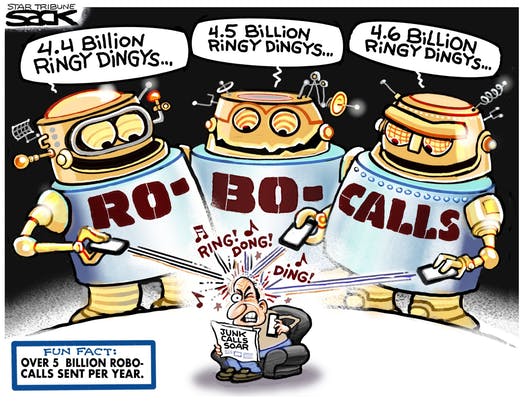

“[R]obocalls … have become a become a major nuisance to the point where I don’t answer any calls unless I know the number — and [I] have missed some very important calls … because of that.”
“I receive so many robocalls that I don’t answer the phone unless I recognize the number.”
“I now find that my cell phone is becoming useless as a telephone.”
This is just a sample of the roughly 630 complaints that the FCC receives about unwanted robocalls each day. Like me, the American people are fed up with this flood of annoying calls. So on June 6, at our monthly meeting, the FCC will vote on giving them some much-needed relief.
Combatting the scourge of unwanted robocalls has topped my consumer protection agenda since I became FCC Chairman. And that’s why we’ve taken many steps to fight these calls. We’ve authorized carriers to block robocalls from certain spoofed numbers. We’ve authorized the creation of a reassigned numbers database. We’ve taken aggressive enforcement action against those who unleash robocalls on consumers. We’ve demanded that phone carriers establish a robust call-authentication framework by the end of this year. And we have been working with Congress on much-needed, bipartisan anti-robocall legislation, like the TRACED ActOpens a New Window. and the STOP Robocalls ActOpens a New Window..
But this isn’t an easy problem to solve, and we always need to be thinking about what more we can do. For example, call-blocking services use analytics to identify and filter out unwanted calls. They can be a powerful weapon in the fight against robocalls, just as email providers routinely filter junk messages into your spam folder. But call-blocking services aren’t very common because they’re only offered on an opt-in basis. In other words, consumers have to actively reach out to their voice service provider to have blocking activated. Few do, and the tide of robocalls keeps coming in.
Thankfully, the FCC can change this. So at our June meeting, we’ll vote on a declaratory ruling that would allow phone companies to implement strong call-blocking services as the default setting for their customers. Basically, instead of being offered call blocking on an opt-in basis, carriers could provide block calls unless you affirmatively opt-out. This could mean a major reduction in robocalls, as call blocking would become the rule, not the exception.
This ruling would also make clear that phone companies can allow consumers to use their own contacts as a “white list.” That means your phone is only going to ring if the call is coming from somebody in your list of contacts. The item also proposes a safe harbor for carriers that block phone calls that aren’t properly authenticated once the call authentication system (called SHAKEN/STIROpens a New Window.) is up and running.
Today, I’m also sharing with my colleagues a Notice of Proposed Rulemaking designed to improve aviation safety. The Aviation Radio Service uses dedicated spectrum to enhance the safety of aircraft in flight, facilitate the efficient movement of aircraft both in the air and on the ground, and otherwise ensure the reliability and effectiveness of aviation communications. Unfortunately, the FCC’s rules for managing these airwaves haven’t kept pace with recent technological advances. That’s why at our June meeting, we’ll vote on several proposals that would enable the use of today’s state-of-the-art safety-enhancing technologies. For example, I’m proposing that we allocate spectrum for Enhanced Flight Vision Systems, which use an advanced radar technology to improved pilots’ ability to detect potentially dangerous objects in fog and other difficult visual environments.
Rounding out our June agenda will be an update to our “leased access” rules. These regulations require cable operators to set aside channel capacity for commercial use by unaffiliated video programmers. The glaring problem with our leased access rules is that they’ve been in legal limbo for over a decade and haven’t been updated to account for the transformation of the video marketplace. Programmers now have a wide range of options for distributing their content, including a plethoraOpens a New Window. of online platforms, so the need for burdensome leased access rules have dramatically diminished. I’ve therefore provided my colleagues with an order that would modernize our regulations to better reflect today’s video marketplace. For example, it would eliminate the requirement that cable operators make leased access available on a part-time basis since there are plenty of other avenues for content creators to make available short-form programming.
We’ve certainly had monthly meetings with more items on the agenda, but with a major item to crack down on unwanted robocalls, this could be one of our most impactful meetings of the year.
Source: FCC.gov
more recommended stories
 Fentanyl Seizures at Border Continue to Spike, Making San Diego a National Epicenter for Fentanyl Trafficking
Fentanyl Seizures at Border Continue to Spike, Making San Diego a National Epicenter for Fentanyl TraffickingFentanyl Seizures at Border Continue to.
 Utah Man Sentenced for Hate Crime Attack of Three Men
Utah Man Sentenced for Hate Crime Attack of Three MenTuesday, August 8, 2023 A.
 Green Energy Company Biden Hosted At White House Files For Bankruptcy
Green Energy Company Biden Hosted At White House Files For BankruptcyAug 7 (Reuters) – Electric-vehicle parts.
 Former ABC News Reporter Who “Debunked” Pizzagate Pleads Guilty of Possessing Child pδrn
Former ABC News Reporter Who “Debunked” Pizzagate Pleads Guilty of Possessing Child pδrnFriday, July 21, 2023 A former.
 Six Harvard Medical School and an Arkansas mortuary Charged With Trafficking In Stolen Human Remains
Six Harvard Medical School and an Arkansas mortuary Charged With Trafficking In Stolen Human RemainsSCRANTON – The United States.
 Over 300 People Facing Federal Charges For Crimes Committed During Nationwide Demonstrations
Over 300 People Facing Federal Charges For Crimes Committed During Nationwide DemonstrationsThe Department of Justice announced that.
